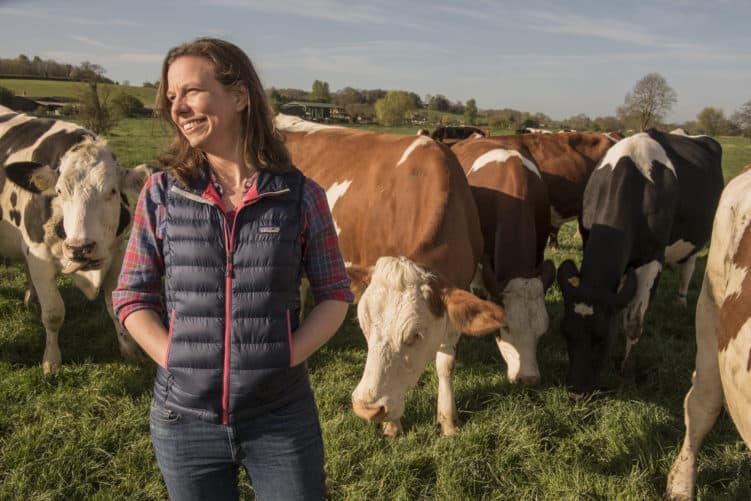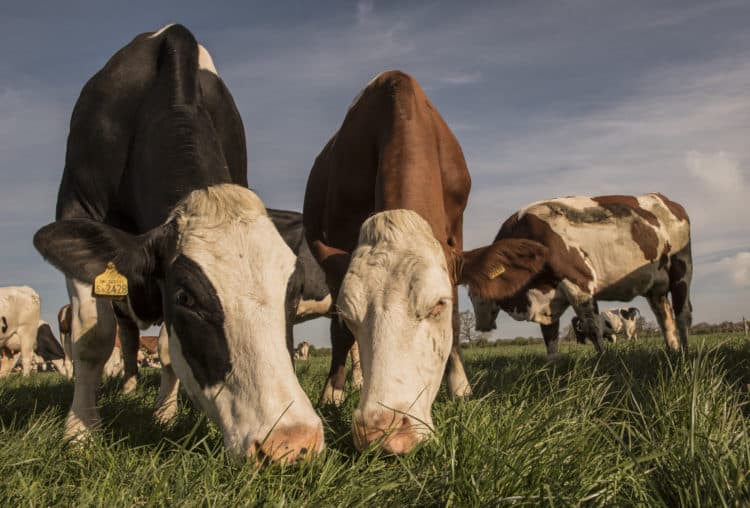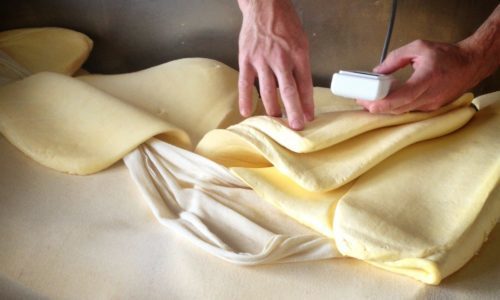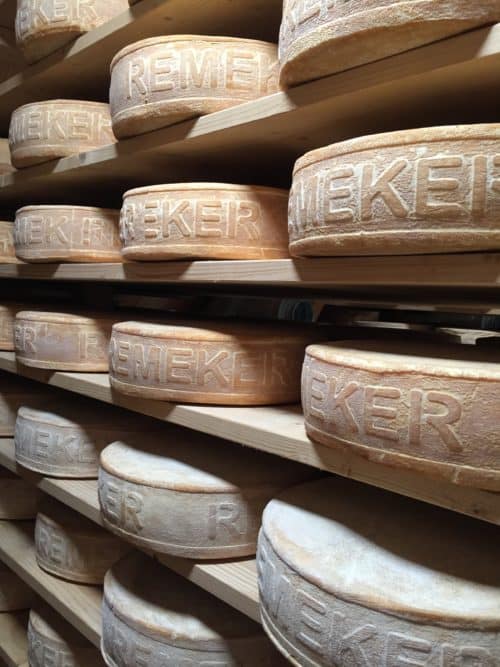
Bronwen Percival, a cheese buyer at Neal’s Yard Dairy in London, wants to stir up a ‘controversy’ in the cheese community. In an industry where most artisan makers use prepackaged cultures and pasteurized milk—leading to, as she describes, “a homogenization of flavor”—this proponent of microbial diversity and raw milk is not afraid to be vocal. “Arguing is great for us,” she says. “There’s not enough arguing in cheese!”
The California native has a deep dedication to provoking dialogue between scientists, cheesemakers, retailers, and consumers. To wit: She co-founded microbialfoods.org, an online resource that synthesizes research on fermented foods; initiated the biennial Somerset, UK–based Science of Artisan Cheese Conference; helped edit the English translation of The Microbiology of Raw Milk (Bronwen Percival, 2017); and, most recently, co-authored the book Reinventing the Wheel: Milk, Microbes, and the Fight for Real Cheese (University of California Press, 2017) with her husband, wine expert Francis Percival. We checked in with Bronwen to learn more about fighting the good fight, her definition of “real cheese”, and how she is trying to change the industry for the better.
culture: Having started several seminars and conferences, plus founding microbialfoods.org, you’re deep into technical food and cheese knowledge. Why is it important to put that technical information back into the public sphere?
Bronwen Percival: One of the early chapters of our book we called The Third Rail because “the third rail” is the technical side of cheesemaking. It feels like the technical side of things often provides a real barrier to understanding. You can either access really complicated scientific papers—which may not
mean anything to somebody who doesn’t have a research science background—or you end up with things that are fluffy and nice but don’t really allow you to engage with anything deeper. Starting gastronomy seminars, microbialfoods.org and then ultimately writing a book is an attempt to introduce technical ideas to people in a way that’s fun and interesting, in the hope that we’re going to start a conversation about the way foods are made and the implications in terms of quality, the environment, and society.
culture: Do you feel the general public understanding of the food system and fermented foods has improved over the years? Do we still have a long way to go?
BP: I think we’re well on our way. A conversation about the microbiome and health is really helping usher the conversation about naturally fermented foods into a much broader, more public sphere and I think there’s tremendous opportunity for cheese to catch hold of that conversation and to use it to normalize things like working with native bacteria and yeasts and molds to get unique flavors.
This is a world where microbes are moving from being the enemy to being our friends, and I think that has everything to do with a shift in perspective—about how we look at cheese. We’re just starting to understand the ways in which native microbes within really well-produced raw milk are actually our biggest allies in terms of flavor and safety.
culture: Do you feel that commodity cheese has any role to play on our plates?
BP: There are certain commodity cheeses that have their gastronomic role in the world. At the same time, factory cheeses are cheap because of the uncosted externalities in the way they’re produced. When we eat cheap factory cheese, the cheapness of that food is really at the expense of all of those environmental, social, public health costs that are there but we’re just not paying directly.
I would love to see a world where we eat way less animal protein, but the animal protein that we eat is really high quality and is produced in a way that respects nature, the environment, and social groups and biodiversity. From that perspective, I would love to see factory cheese playing less of a role in our diet just like I’d see factory produced meats play less of a role (too).
culture: Switching gears a little bit, let’s talk about Neal’s Yard Dairy. You guys redefined how to select and stock cheeses, and now you are focussing on smaller, more intricately-curated selections. Do you have any advice for other shops and mongers that may be experiencing similar issues?
BP: Absolutely. We had too many different cheeses on the counter, and the quality of the ones that weren’t moving as quickly was deteriorating because they were sitting out for too long. That drove us to think about why we wanted to refine our selection—but then the question became: How do we decide?
If we just said “we’re going to just take the cheeses we sell the least of and take them off the counter,” that would mean we’d take off some cheeses that were interesting—that potentially had the opportunity to get better. At Neal’s Yard Dairy we say that we set out to improve British cheese. The counter is an incredibly important part of that ecosystem where we can solicit feedback on the cheeses and pass it back to the cheesemaker and give them the tools to make it better.
So we make this matrix, where we gave weight to different things that we really value. It includes things like farmhouse cheese—the idea that the person who is making the cheese owns those animals, and they’re really thinking about milk production and optimizing it for their cheese. Raw milk is important. A cheese that… doesn’t just express the starter (cultures) that were added but really tries to draw out the flavors of the milk. The [aspect] that has the most weight within our entire matrix is the potential to get better. Because a cheese that’s so-so right now can be in a different world a year later if the person behind it is really participating in that conversation and is responsive.
We approached (the system) with huge trepidation and three months in, it’s been a total success. The cheese quality on the counter has gotten better because we’re moving through it more quickly. It’s also allowed us to start a conversation with customers to explain the role we’re playing. It’s good to be dynamic. It’s good to change things around. Something that seems a little bit radical and scary can have the opportunity to make us grow.
culture: In addition to enhancing communication between customers and cheesemakers, you’re enhancing connections between cheesemakers and scientists. What do you feel is the optimal relationship between these groups? What do we still need to work on?BP: One of the best things about the Science of Artisan Cheese Conference that I started in Somerset, is the opportunity to get the cheesemakers and scientists in the same room. At the same time, it’s clear that the product of those scientists’ work is not easily translatable to, “now I’m going to go back to my farm and change these three things”. There’s a translation that needs to occur. But getting (these groups together) allows cheesemakers to express what matters to them in a way that can guide scientists to think about how they are posing their questions—and the ultimate impact of the work that they are doing, and that’s really valuable.
One of the things that I think France does really beautifully is that they have the infrastructure to translate scientific research. That’s why we looked at France when we were looking to see how to optimize our own microbial communities in raw milk. In France, at the institutional level, there are…organizations that translate scientific research into practical guidelines, and then there are technicians who too visit the farm and hold cheesemakers’ hands as they put guidelines into place. We were able to translate the book on the microbiology of raw milk, and it has been an amazing experience to see how hungry people are for that information.
culture: What kind of change would we need in a mindset for our political entities and the FDA to further create guidelines for cheesemakers that are more meaningful and sensible?
BP: At the end of the day the FDA and the cheesemakers have the same goal, which is to get safe cheese on the market. But sometimes—I think because the way we talk about our values or what we are doing is so different—unwittingly we put wedges between different groups.
In order to start off this conversation in the right way, what we need to do is couch our arguments for why raw milk is really important in the values of the regulators. So if you’re talking with someone who values science and technology and modernity and control, what you can say is, “look, these farmhouse cheeses are actually far more sophisticated and the microbial communities working within them have the capacity to be far safer”.
We need to look at the latest research and understand how (microbial communities) work—just like people are doing with the human microbiome, to usher in a future for cheese that’s far more scientific, far more controlled but also has far more interest associated with it. Making farmhouse cheese becomes the progressive, rational thing to do as opposed to the regressive, old-school…argument.
culture: Let’s chat about your husband and your book. What ideas are you trying to get into the public sphere?

BP: (There’s this) idea of cheese being a house versus a canvas. Is milk this blank slate on which you can just paint whatever you want by adding cultures? If that’s the case, (then) the way you make milk isn’t really important. You can use commodity milk, which is really cheap, to make cheeses that have splashy, sweet or whatever flavors that people like—but ultimately are quite dull, because you can just get them out of a packet. There are a lot of cheeses that taste the same because of exactly this. It’s one approach to cheesemaking, and I have to say it’s probably the most prevalent even amongst artisan cheesemakers today, because it’s easy.
Then there’s this other idea that cheesemaking is like building a house and that you need milk that is packed with intrinsic potential because of the way it’s farmed. Milk with something that’s interesting and unique. That’s not to say starter (cultures) are bad and no starter is good or anything like that—you might add a little bit of starter to help along fermentation, but you’re not adding a starter for flavor. When you build that house you’ve created, the environment then selects the microbial winners. That allows the diversity in milk to really express itself in this cheese that could never ever be made anywhere else than on your farm—what it is really showing is the unique community of microbes that you fostered with your farming and with your cheesemaking.
I think fundamentally that’s a big controversy. The thing is, nobody knows it’s a controversy yet. We want to make that a controversy, that people care about and that they take sides on, and that we can argue about—because arguing is great for us. There’s not enough arguing for cheese!
culture: What is it like being a cheese and wine power couple with your husband Francis?
BP: It’s quite fractious most of the time! They say cheese and wine go well together, but I think it’s interesting how most of our biggest breakthroughs and innovative new ideas are born of massive arguments about the similarities between these two industries. It’s wonderful because we always have something to talk about, but it’s also wonderful because we always have something to argue about.
culture: So when you’ve retired, in your final years sitting on your porch in a rocking chair, what is the ultimate goal that you want to have contributed to the world?
BP: If at the end of the day I can help to start a conversation that reconnects farming and flavor, that means there’s a moral value to flavor rather than just flavor being whatever’s yummy, that people buy and understand what they eat and the flavors in their mouths according to the impact, the meaning of those flavors—then I (shall) feel that’s all I could hope to accomplish.
Photos courtesy: Bronwen Percival






I’m reading their book right now and your interview was a perfect pairing to enhance my enjoyment. A must read for cheesemongers!
Thanks for this thoughtful interview.